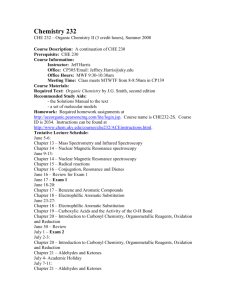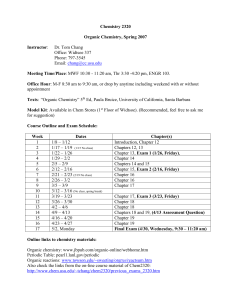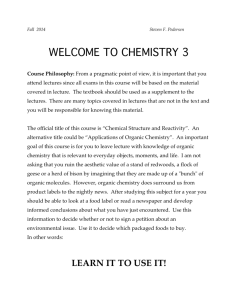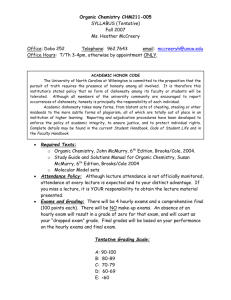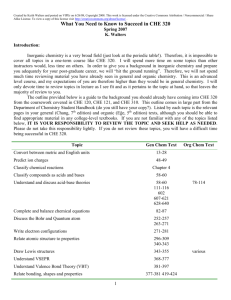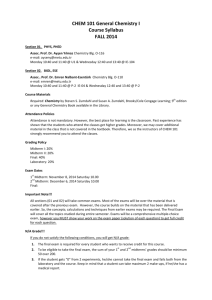NOTE: All exams except the final are held during the regular class
advertisement
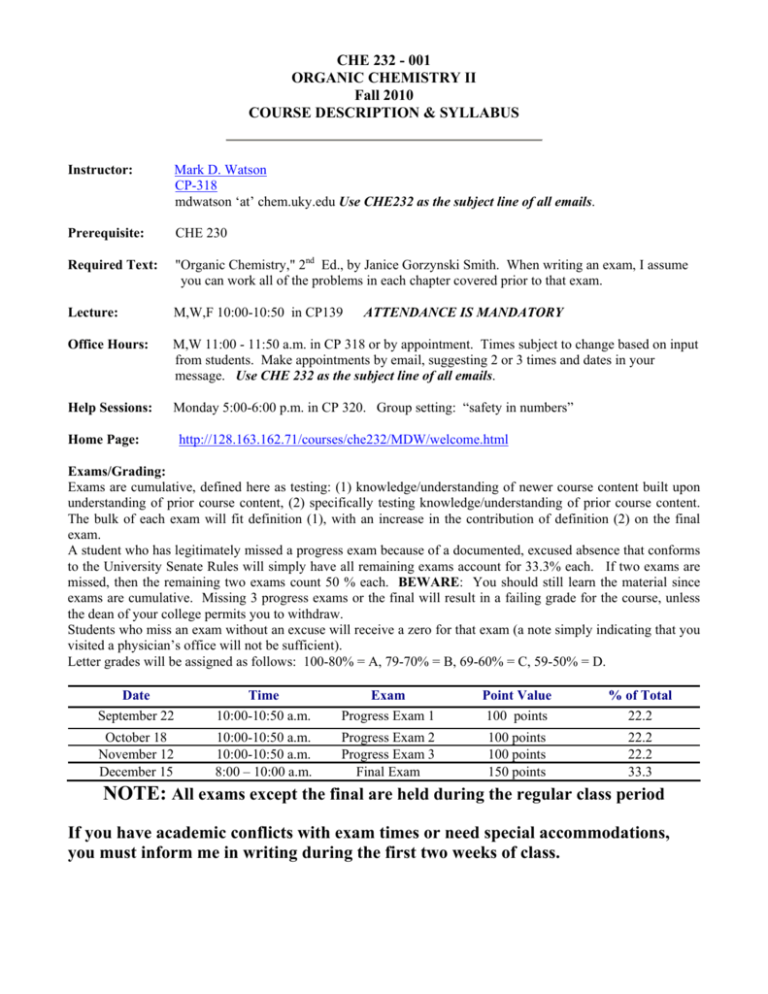
CHE 232 - 001 ORGANIC CHEMISTRY II Fall 2010 COURSE DESCRIPTION & SYLLABUS Instructor: Mark D. Watson CP-318 mdwatson ‘at’ chem.uky.edu Use CHE232 as the subject line of all emails. Prerequisite: CHE 230 Required Text: "Organic Chemistry," 2nd Ed., by Janice Gorzynski Smith. When writing an exam, I assume you can work all of the problems in each chapter covered prior to that exam. Lecture: M,W,F 10:00-10:50 in CP139 Office Hours: M,W 11:00 - 11:50 a.m. in CP 318 or by appointment. Times subject to change based on input from students. Make appointments by email, suggesting 2 or 3 times and dates in your message. Use CHE 232 as the subject line of all emails. Help Sessions: Monday 5:00-6:00 p.m. in CP 320. Group setting: “safety in numbers” Home Page: ATTENDANCE IS MANDATORY http://128.163.162.71/courses/che232/MDW/welcome.html Exams/Grading: Exams are cumulative, defined here as testing: (1) knowledge/understanding of newer course content built upon understanding of prior course content, (2) specifically testing knowledge/understanding of prior course content. The bulk of each exam will fit definition (1), with an increase in the contribution of definition (2) on the final exam. A student who has legitimately missed a progress exam because of a documented, excused absence that conforms to the University Senate Rules will simply have all remaining exams account for 33.3% each. If two exams are missed, then the remaining two exams count 50 % each. BEWARE: You should still learn the material since exams are cumulative. Missing 3 progress exams or the final will result in a failing grade for the course, unless the dean of your college permits you to withdraw. Students who miss an exam without an excuse will receive a zero for that exam (a note simply indicating that you visited a physician’s office will not be sufficient). Letter grades will be assigned as follows: 100-80% = A, 79-70% = B, 69-60% = C, 59-50% = D. Date Time Exam Point Value % of Total September 22 10:00-10:50 a.m. Progress Exam 1 100 points 22.2 October 18 November 12 December 15 10:00-10:50 a.m. 10:00-10:50 a.m. 8:00 – 10:00 a.m. Progress Exam 2 Progress Exam 3 Final Exam 100 points 100 points 150 points 22.2 22.2 33.3 NOTE: All exams except the final are held during the regular class period If you have academic conflicts with exam times or need special accommodations, you must inform me in writing during the first two weeks of class. Objectives: This course is the second of a two-part introduction to the principles of organic chemistry. The material will build upon the knowledge you have retained from CHE 230. You will learn more about the nature and reactivity of organic compounds carrying various functional groups such as conjugated multiple bonds, aromatic units, the ubiquitous carbonyl compounds, as well as complex molecules stringing together several functionalities. Alongside learning how to put together molecules using these functionalities as “handles” or “hooks”, you will learn to think “backwards”, dissecting a molecule to its parts (a.k.a. retrosynthesis) in much the same way you recognize nuts and bolts as positions to dissemble a mechanical object. We will also discuss the means by which chemists interrogate molecules and force them to provide us with information. These are spectroscopic techniques that tell us what kinds of molecules they are. Putting my enthusiasm for chemistry aside for a moment, the most important thing to take from this course is further refinement of your skills of reasoning, logical problem-solving, and the ability to put together the “big picture”. Organic chemistry uses a language of symbols with constantly changing meanings, depending on their context. This can seem bewildering, but will serve as a tool to develop pattern recognition and analytical skills. Trust me, the patterns are there. Tips for Success: In case you haven’t retained the information from CHE 230, August 25, 2010 is a good day to start reviewing. Depending on our pace, we will cover topics corresponding to 500-600 pages of new material in the textbook this semester. Hit the book and get ahead!!! Falling behind will start a snowball effect. Very, very few people can “cram” organic chemistry the night before an exam. Read the chapters before they are covered in class. You’ve heard this before, but trust me…just do it. The lectures will present a large portion of what is included in the textbook, but are mostly intended to provide another perspective which will help you to put together the themes about which you have already read. No instructor can teach you organic chemistry. You must be an active learner. There is a very strong correlation between working problems and scoring well on exams. Work all of the problems at the end of each chapter. When you are reading the chapter, stop at each in-chapter problem and solve it. A very common comment is "I can work the problems fine, but then I can't do it on the exam". There is a big difference between solving problems with the help of a solutions manual, and becoming sufficiently comfortable with the material to quickly access and use the information that you have learned. Practice, practice, practice. Organic chemistry involves learning a lot of new material. Memorizing material is unavoidable, but a key to this course is understanding the recurring themes. If you do this, at some point you will encounter a new reaction or molecule and be able to predict the answers to questions. Memorization alone will, at the very best (with luck), earn you a letter grade of “C”. Attend every lecture and use my time (office hours and help sessions) as needed. I didn’t choose this academic career because I like to get paid much less than if I were working in industry. I enjoy the job. Take advantage of that. I am here to help all of you who are willing to join me in putting in the effort. CHE 230 and 232 are cumulative. If something gives you troubles on one exam (including CHE 230), don't let it hurt you again on a later one. A few days before each exam, I will either post an old exam on the course homepage, or send it via email (several other professors have exams posted as well). Take the exams with a time limit of 50 minutes, not at your leisure. This will let you know if you are ready for the upcoming exam. If you feel like asking me whether an exam will cover the lectures or the textbook, then we have failed to communicate ideas and concepts. If I haven’t made the connections clear, be sure to meet with me early and often.
